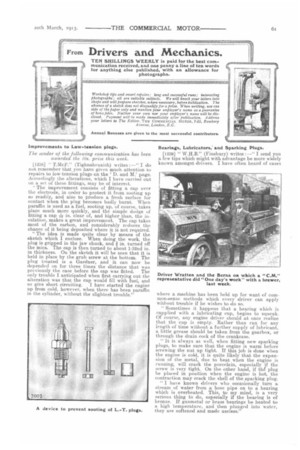From Drivers and Mechanics.
Page 23

If you've noticed an error in this article please click here to report it so we can fix it.
TEN SHILLINGS WEEKLY is paid for the best communication received, and one penny a line of ten words , for an hing else published, with an allowance for photographs.
Workshop tips and smart repairs; long and successful runs; interesting photographs; all are suitable subjects. We will knock your letters into shape and will prepare sketches, where necessary, before Publication. The absence of a sketch does not disqualify for a prize. When writing, use one side of the paper only and mention your employer's name as a guarantee of bona fides. Neither your own nor your employer's name will be disclosed. Payment will be made immediately after publication. Address your letters to The Editor, THE COMMERCIAL MOTOR, 7-15, Rosebery
Avenue, London, E.G.
Annual Bonuses are given to the most successful contributors.
Improvements to Low-tension plugs,
The sender of the following communication has been awarded the Ws. prize this week.
[1238] " T.McB." (Tighnabruaich) writes :—" I do not remember that you have given much attention to repairs to low-tension plugs on the D. and M.' page. Accordingly the alterations, which I have carried out on a set. of these fittings, may be of interest.
The improvement consists of fitting a cap over the electrode, in order to protect it from sooting up so readily, and also to produce a, fresh surface for contact when the plug becomes badly burnt. When paraffin is used as a fuel, sooting up, of course, takes place much more quickly, and the simple dodge of fitting a cap Tly in. clear of, and higher than, the insulation, makes a great improvement. The cap takes most of the carbon, and considerably reduces the chance of it being deposited where it is not required.
"The idea is made quite clear by means of the sketch which I enclose. When doing the work, the plug is gripped in the jaw chuck, and in. turned off the mica. The cap is then turned to about 1-32nd in. in thickness. On the sketch it will be seen that it is held in place by the grub screw at the bottom. The plug treated is a Gardner, and it can now he depended on for three times the distance that was previously the case before the cap was fitted. The only trouble I anticipated when first carrying out the alteration was that the cup would fill with fuel, and so give short circuiting. I have started the engine up from cold, however, when there has been paraffin in the cylinder, without the slightest trouble." Bearings, Lubricators,' and Sparking Plugs.
[1239] " W.H.B." (Finsbury) writes :—" I send you a few tips which might with advantage be more widely known amongst drivers. I have often heard of cases
where a machine has been held up for want of common-sense methods which every driver can apply without trouble if he wishes to do so.
" Sometimes it happens that a bearing which is supplied with a lubricating cup, begins to squeak. Of course, any engine driver should at once realize that the cup is empty. Rather than run for any length of time without a further supply of lubricant, a little grease should be taken from the gearbox, or through the drain cock of the crankcase.
" It is always as well, when fitting new sparking plugs, to make sure that the engine is warm before screwing the nut up tight. If this job is done -when the engine is cold, it is quite likely that the expansion of the metal, due to heat when the engine is running, will crack the porcelain, especially if the screw is very tight. On the other hand, if th4' plug be placed in position when the engine is hot, the contraction may crack the shell of the sparking plug.
" I have known drivers who occasionally turn a stream of water from a hose pipe on to a bearing which is overheated. This, to my mind, is a very serious thing to do, especially if the bearing is of bronze. If gunmetal or brass bearings be heated to a. high 'temperature, and then plunged into water, they are softened and made useless."
























